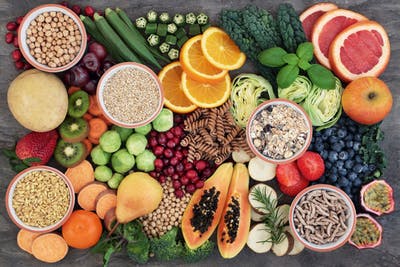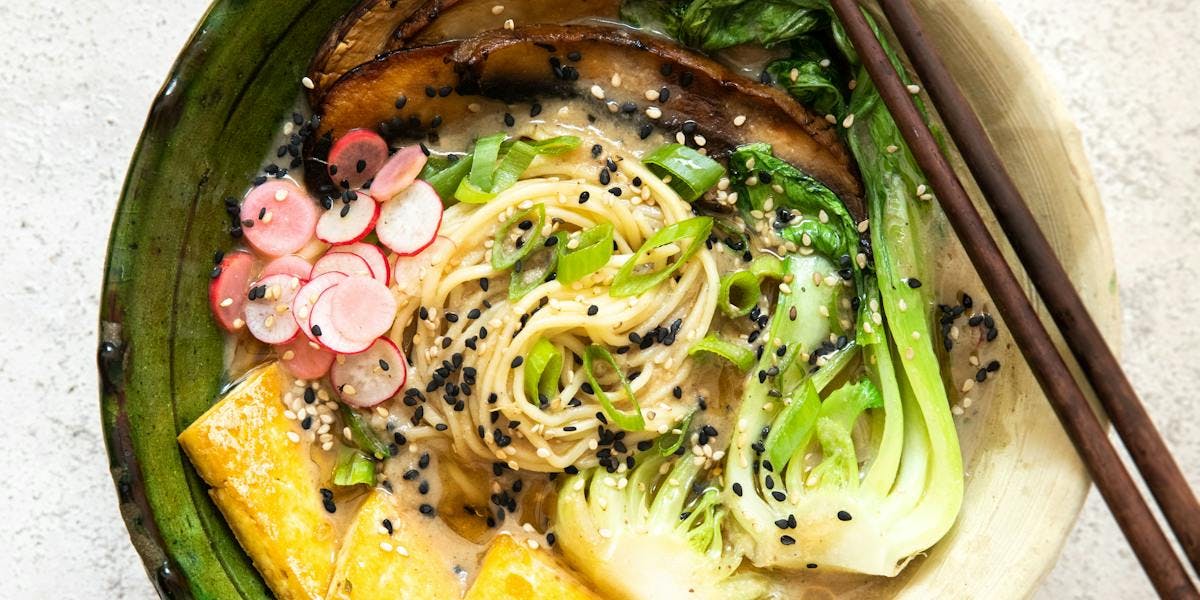Lifestyle
Is a Vegan Diet Healthy?
by Emily Neill
min read
We’re all about encouraging a life powered by plants, so in this post we’re exploring both the health pros and cons of enjoying a plant-based diet.
Yes – it’s absolutely possible to get all of the nutrients your body needs in order to stay energised and healthy from a vegan diet. There are also many health benefits associated with a vegan diet, such as increased fibre and reduced saturated fat. As with any diet, the key is being mindful of the different nutrients you’re consuming, and varying them so you’re getting a whole host of micronutrients.
We’re all about encouraging a life powered by plants, so in this post we’re exploring both the health pros and cons of enjoying a plant-based diet.

What are the health benefits of a vegan diet?
The main benefits associated with enjoying a plant-based diet are:
- More dietary fibre
- More vitamins (including folate, C and E)
- More magnesium and potassium minerals
- Lower blood pressure
- Lower cholesterol
- Lower body mass index (BMI)
- Improvements in blood glucose control
On the health front, lots of studies have reported that followers of a vegan diet tend to have lower BMIs, blood pressure and cholesterol. And it’s these factors (lower BMI, blood pressure and cholesterol) that are likely to be responsible for the reduced risk of heart disease associated with being vegan.
A plant-based diet also tends to serve us with more fibre, folate, vitamin C, vitamin E, potassium, magnesium and less saturated fat from the various fruits, vegetables, nuts, seeds and grains that we consume. Vitamins and minerals are essential nutrients, performing hundreds of vital roles in our bodies. So, the fact plant-based foods in particular are high in these essential nutrients, makes a vegan diet beneficial for us.
Higher fibre intake contributes both towards satiety, and hence better weight control (high fibrous foods keep you feeling fuller for longer), as well as improvements in blood glucose control (important for type 2 diabetics). In fact, research published in 2009 found that diabetics who followed a vegan diet exhibited greater improvements in blood glucose control, with some participants able to reduce their diabetic medications.
Are there health risks of being vegan?
There are no health risks that have been directly associated with a vegan diet. There’s some evidence suggesting that the lower cholesterol levels (associated with the vegan and vegetarian diet) may be linked to a small risk of haemorrhagic stroke. But the same factor (low cholesterol), is protective for heart disease and ischemic stroke. People worry about whether or not a vegan diet provides enough vitamin B12, protein, calcium, vitamin D, iron and omega-3 fatty acids but there are plenty of vegan foods available that ensure we get enough of these essential nutrients. More on these next…
Potential deficiencies and how to avoid them

Vitamin B12
B12 is an important vitamin that keeps our nerve and blood cells healthy. It’s found in meat, fish, eggs and dairy, but not in fruit or vegetables, and is therefore an important consideration to those following a plant-powered diet. Whilst many opt to take a B12 vitamin supplement, it is in fact super easy to get your recommended daily amount (it's recommended that adults consume just 0.0015mg (1.5µg) of B12 per day) through plant-based foods. For example, 1 serving of Marmite a day provides you with 0.0019mg (1.9µg) of Vitamin B12 and 1 serving of Engevita Nutritional Yeast flakes provides 0.0022mg (2.2µg). Read more about this vitamin here.
Protein
Despite the amount of air time this gets in discussions around vegan diets, dieticians never see issues with protein deficiencies when following a vegan diet, because protein is actually present in all foods (to varying degrees). The only instances where protein deficiencies are seen are in cases of malnourishment. It’s recommended that adults consume approximately 46-55 grams of protein per day, which means that most UK adults actually eat double the amount that’s required. If you want to give yourself an additional protein boost for whatever reason while enjoying a plant-based diet, you can. Learn about plant-based foods high in protein here and the best vegan protein powders here.
Calcium and Vitamin D
Often found together in foods, these two nutrients also work together to maintain bone health. Nutritional guidelines state that the average adult in the UK should have a daily calcium intake of around 700mg (this rises to 1200mg for people over 54) and 10-20mg vitamin D. Again, plenty of plant-based foods contain calcium. Leafy green veg, figs, sweet potatoes, almond butter, edamame beans and tofu are just some of the best plant-based sources of calcium.
Sunshine is the absolute best source of Vitamin D! But the best vegan food sources (for when the English weather isn’t on form) are mushrooms, fortified food and drinks including soy milk, orange juice and cereals. Find out more about maintaining your calcium and vitamin D intake here.
Iron
Iron-rich foods include, nuts, beans, lentils, dark leafy vegetables and fortified breakfast cereals. The recommended dietary allowance of iron for adults (aged 19-50) is 0.018mg per day (18µg) and 0.008mg per day (8µg) for adults over 50. So as long as you’re enjoying fruit and vegetables of every colour, as well as the other plant-based options mentioned previously, you’ll easily meet these recommendations. As with B12, if you’d like to, you can top this up by trying an iron supplement.
Omega-3 fatty acids
These essential fatty acids are the unsaturated fats that benefit the cardiovascular system as well as playing key roles in brain and eye health, and reducing chronic inflammation. The best vegan sources are eggs, and sea vegetables, but they can be found in nuts and seeds like flax seeds, chia seeds, and walnuts. Find out more about healthy fats for vegans here.
Looking for more vegan health tips? Visit the health section of our blog.
By Emily Neill
Emily is our Content and Community Assistant by day, and qualified PT by… later that day. She couldn’t live without exercise (makes sense) so can usually be spotted in her favourite spin class, with our Three Mushroom Risotto for afters.
Let us take care of dinner
We help to make eating more plants easy and delicious. Fancy letting us take care of dinner? Check out our delicious meals here.
Shop now
